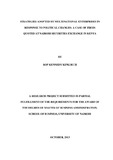| dc.description.abstract | Organizations respond to the external environment and develop strategies that enable
them to survive the ever changing environment that they operate in (Beck et al., 2010).
One of the environmental factors that most enterprises have to deal with is the political
environment. Companies have to respond to the environment strategically in order to be
sustainable and avoid losses (Johnson et al., 2008; 2005). By using an effective strategy,
a company can stay competitive and relevant to the market (Thompson and Strickland,
2003). The political environment is a key component of the external business
environment. The election politics and environment in Kenya often affect the MNC
business. The factors that have shaped and influenced the country’s political environment
include consumers, households and communities; the electoral legislation and
administration of justice as well as discipline of law enforcement agencies; the economic
impact in terms of taxation, government spending, general demand, interest rates,
exchange rates and global economic factors; political and government policy; rapid
technological changes that also affect production processes and product innovation in
business; among others. The objective of this study was to determine strategies that have
been adopted by MNCs in response to political changes in the external environment of
firms quoted at the NSE in Kenya. This study utilized descriptive survey. The population
of interest comprised of 60 companies operating in Nairobi, Kenya. The study employed
primary data collection. Primary data was collected through a self-made questionnaire.
The data was analyzed using descriptive statistics and in particular, using the mean as a
measure of central tendency. From the findings, the respondents indicated that the
political environment in Kenya was stable although a moderately high number described
the political environment for the last two general elections (2008 and 2013) as being very
uncertain and risky. From the findings, majority of the respondents strongly agreed that
the multinational home country relations with the host country is cordial and good, that
the political environment in the country allows firm market their products and services
freely and that the political structure and nature in Kenya is conducive for carrying out
business. From the findings, to survive in a dynamic and highly political external
environment an organization has to engage various strategies to survive. According to the
respondents one such strategy is the turnaround strategy. Companies adopt strategies
directed at improving, the effectiveness of basic operations within the company, such as
production, marketing, materials management, research and development, and human
resources. From the findings, organizational process affects the adoption of various
response strategies. The major challenges in adoption of response strategies appear to be
more cultural and behavioral in nature, including the impact of poor integration of
response strategies and diminished feelings of ownership and commitment. The
following conclusions are drawn; organizational process affects the adoption of various
response strategies, companies adopt strategies directed at improving, the effectiveness of
basic operations within the company, such as production, marketing, materials
management, research and development, and human resources. | en |

